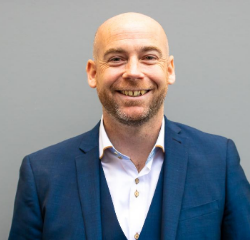
With the backlog of work caused by COVID-19, it took a while for Julie Sandoval, echo service manager, Leeds Teaching Hospitals NHS Trust and Professor Martin Stout, consultant cardiac physiologist with a specialist interest in cardiac imaging, Wythenshawe Hospital, Manchester, to find a time to chat.
“Eventually, when I did manage to catch up with Martin, it was a joy,” said Julie, who asked Martin about his career, his role within the British Society of Echocardiography (BSEcho), his predictions for the future – and football.
What’s your current role?
Consultant cardiac physiologist with a specialist interest in cardiac imaging. In terms of echo, it’s TTE and stress, mainly acute admissions to ED.
BSEcho has long held a tradition of not only having a great domestic faculty, but also international speakers. Who is coming this year?
How did you get involved with BSEcho?
I helped out with a few of the new practical exams when the current president, Keith Pearce, was chair of the accreditation committee. I moved on to the education committee around 2010 and have been there ever since.
What changes have you seen on the education committee over the last 10 years?
I have seen lots of new faces, who all bring valuable qualities, and the introduction of research, audit, and more evidence-based guidelines. A more progressive approach to big meetings, with the introduction of dedicated research and physiologist session, has also evolved over the last decade.
Tell me about your career as a physiologist and within echo, and what changes you have seen over the years.
I’ve been a physiologist since 2000, and I started in echo in 2003, passing the BSE in 2004.
There have been so many changes in the profession, including the job titles! The most important and, in my opinion, the best, change has been the introduction of physiologist-led services. This has allowed us to make our own decisions and judgements, and enabled us to better provide for our patients’ needs.
Can you tell me a little about your role at the National School of Healthcare Science (NSHCS)?
I’m an honorary professor at Manchester Metropolitan University (MMU) for their cardiac science delivery and have led the Scientist Training Programme (STP) and Higher Specialist Scientist Training (HSST) since 2012. I’m also lead editor for the new NSHCS STP curriculum, and to continue to supervise PhD and HSST research for MMU.
(Julie: “Wow so you’re a Doc Martin,” I said, referring to Dr Martin Ellingham, a grumpy, socially inept but lovable curmudgeon played by Martin Clunes in the popular TV series set in Cornwall. I must point out that despite sharing names, BSEcho’s Doc Martin Stout bears no resemblance to ITV’s Doc Martin.)
When did you obtain your PhD and what was your focus?
I finished my PhD in 2012, we did a study looking at testosterone in males with heart failure (HF), which was basically controlled doping in males with HF and low testosterone. We looked to see if we could accelerate the impact of exercise. I worked with Professor Kevin Channer while doing a research fellowship at Sheffield.
Wow – it’s a small world, I also worked with Professor Channer. What advice would you give to those physiologists just beginning their career?
Learn from as many people as possible – medics, physiologists, cath lab staff, nurses. It’s not just the echo stuff that makes you a good echocardiographer, it’s the whole package of cardiology.
What do you think the future looks like for those working in echo?
I think the future is bright for scientists and physiologists, and I can see our roles extending further to include prescribing and leading patient care.
You’re already a busy man, but have you any future ambitions and goals that you’d like to share with us?
I’d like to do more research and further develop physiologists and scientists into more advanced roles.
What do you think about the repetitive strain injuries sometimes suffered by sonographers whilst doing their jobs?
I think sonographers need to be able to do other roles, so that they are not scanning 24/7. They should also learn to scan in multiple ways and have enough courage to challenge management when practices or conditions are not good for them.
Have you always lived in Manchester, and, if so, are you a City or United fan?
I’ve been in Manchester since 2001 but I was brought up in Wigan and I’m a Liverpool fan.
View the full programme